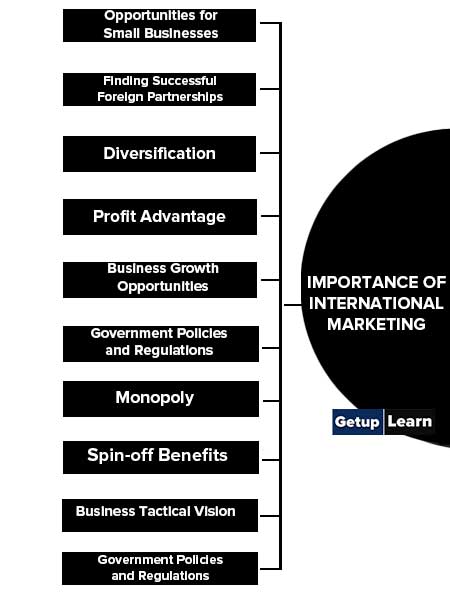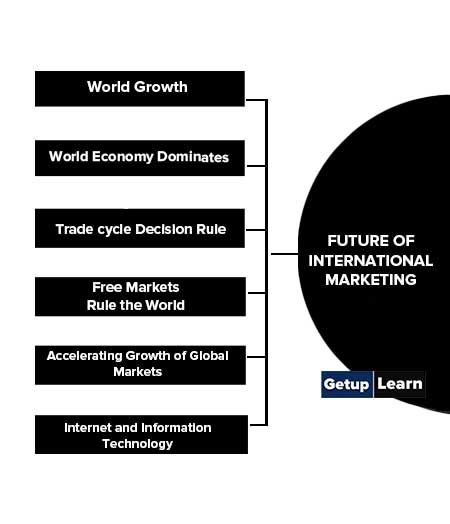Table of Contents
Importance of International Marketing
There are several importance of international marketing:
- Opportunities for Small Businesses
- Finding Successful Foreign Partnerships
- Diversification
- Profit Advantage
- Business Growth Opportunities
- Competition
- Government Policies and Regulations
- Monopoly
- Spin-off Benefits
- Business Tactical Vision

Opportunities for Small Businesses
Going global is an important opportunity for small business owners in India. Any entrepreneur can use the Internet to market products and services to buyers in foreign markets. He must build a system to satisfy foreign consumers’ needs, such as shipping goods overseas and paying appropriate export fees.
Other types of businesses that provide all of their services through the Internet can go global, marketing to foreign consumers online, without some of the difficulties of creating a global supply chain and different distribution networks.
Finding Successful Foreign Partnerships
Another benefit of going global is enjoyed by companies of different sizes, not just small businesses. Many times, your company saves money because expenses such as labour costs charged by business partners overseas are cheaper.
Also, foreign workers carrying out your company’s operations are familiar with the needs of local consumers; they live and work in the same foreign culture.
Diversification
The benefit of globalization is that a company can diversify its consumer base and revenue streams. A company that markets only to Indian consumers is especially vulnerable to domestic economic trends.
With consumers in other countries buying your products and services from the international division, your company can maintain revenue streams in foreign markets.
Profit Advantage
International business may help to improve the bottom line of a firm. Even when international business is less profitable than domestic, it could increase the total profit. There are many companies which make the major share of their profits from foreign markets.
There are also MNCs which earn more than 100% of their profits from foreign markets.
Business Growth Opportunities
An important reason for going international is to take advantage of the opportunities in other countries. MNCs are getting increasingly interested in a number of developing countries as the income and population are rapidly rising.
Of the one billion people estimated to be added to the world population between 1999 and 2014, only about 3% will be in the high-income economies.
Competition
Competition may become may a driving force behind internationalization. A protected market does not normally motivate companies to seek business outside the home market. Until the liberalization which started in July 1991, the Indian economy was a highly protected market.
Not only that the domestic producers were protected from foreign competition but also domestic competition was restricted by several policy-induced entry barriers, operated by such measures as industrial licensing and the MRTP regulations.
Being in a seller’s market, the Indian companies, in general, did not take the foreign market seriously.
The economic liberalization ushered in India since 1991, which has increased competition from foreign firms as well as from those within the country has, however, significantly changed the scene. Many Indian companies are now systematically planning to go international in a big way.
Government Policies and Regulations
Government policies and regulations may also motivate internationalization. There are both positive and negative factors which could cause internationalization. Many governments give a number of incentives and other positive support to domestic companies to export and invest in foreign countries.
Similarly, several countries give a lot of importance to import development and foreign investment
Monopoly
In some cases, international business is a corollary of the monopoly power which a firm enjoys internationally. Monopoly power may arise from such factors as monopolization of certain resources, patent rights, technological advantage, product differentiation, etc.
Such monopoly power need not necessarily be an absolute one but even a dominant position may facilitate internationalization.
Spin-off Benefits
International business has certain spin-off benefits too. International business may help the company to improve its domestic business. International business, thus, becomes a means of gaining better market share domestically.
Further, exports may have pay-offs for the internal market too by giving the domestic market better products.
Business Tactical Vision
The systematic and growing internationalization of many companies is essentially a part of their business policy or strategic management. The stimulus for internationalization comes from the urge to grow, the need to become more competitive, the need to diversify and to gain strategic advantages of internationalization.
Many companies in India, like several pharmaceutical firms, have realized that a major part of their future growth will be in foreign markets.
Read More About: ????Benefits of International Marketing????
Future of International Marketing
Future of international marketing concentrate on the following factors:
- World Growth
- World Economy Dominates
- Trade cycle Decision Rule
- Free Markets Rule the World
- Accelerating Growth of Global Markets
- Internet and Information Technology

World Growth
Many of the poor countries of the world are getting richer faster than the rich countries of the world, which are also getting richer. Most of the world is in a stage of economic growth. Asia is growing at annual rates of 7% or higher.
China and India started to develop a middle class through international marketing. The population within the developed economies of the world is continuing to grow and will be a major market for goods and services across a broad spectrum of consumer products
World Economy Dominates
The macroeconomics of the nation-state no longer controls economic outcomes in countries. Large superpower countries such as the United States can no longer dictate to poorer countries how they should behave.
Trade cycle Decision Rule
As a product matures, its production location would shift to lower-income countries, has been clarified. Changes in the global competition are bringing companies into more direct competition with economic rivals in other parts of the world.
Companies in the same industries in different countries and regions compete ferociously with each other in manufactured goods, agricultural products, natural resources, and services.
Free Markets Rule the World
The 75-year contest between capitalism and communism is over. Markets are in control of the allocation of resources all over the world with the exception of the two autocratic national acronyms, Cuba and North Korea.
Accelerating Growth of Global Markets
The engine behind this accelerating growth is the high rate of growth in both high and low- income countries. The high-income county growth leadership has shifted from Japan to the United States.
Low-and lower-middle-income country growth leadership has been concentrated in South East Asia and southern Asia with China as a unique. The driving forces of this growth are technology, deregulation, global integration, and the triumph of marketing.
Internet and Information Technology
The Rise of the Internet and Information Technology: The rapidly growing diffusion of Internet access combined with the rapidly expanding bandwidth and capacity of the global Internet itself will play a major role in supporting the growth of global markets and global marketing.
Amazon.com can reach customers in Taiwan and Tokyo just as easily as it can reach customers in Boston.
Read More About: ????Factors Affecting International Marketing????
What is the importance of international marketing?
The following are the importance of international marketing:
1. Opportunities for Small Businesses
2. Finding Successful Foreign Partnerships
3. Diversification
4. Profit Advantage
5. Business Growth Opportunities
6. Competition
7. Government Policies and Regulations
8. Monopoly
9. Spin-off Benefits
10. Business Tactical Vision.
What is the future of international marketing?
Future of international marketing:
1. World Growth
2. World Economy Dominates
3. Trade cycle Decision Rule
4. Free Markets Rule the World
5. Accelerating Growth of Global Markets
6. Internet and Information Technology.















